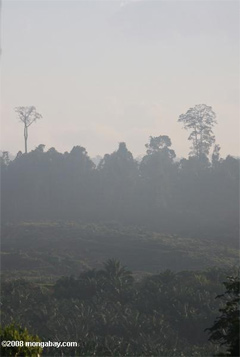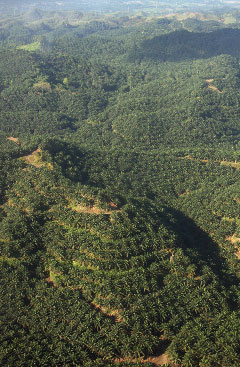Palm oil producers in Indonesia reject moratorium on forest destruction
Palm oil producers in Indonesia reject moratorium on forest destruction
mongabay.com
August 28, 2008
Palm oil companies operating in Indonesia have rejected a proposed moratorium on clearing forests and peatlands for oil palm plantations, reports the Jakarta Post.
The Indonesian Palm Oil Producers Association (GAPKI) — a group with 250 palm oil producers — said that a ban on converting natural ecosystem for oil palm estates would hurt the economy, increasing unemployment and poverty.
“Indonesia does not need to apply a moratorium on its forest. GAPKI strongly rejects the forest conversion moratorium idea,” GAPKI executive Derom Bangun was quoted as saying by the Jakarta Post at a Greenpeace-organized conference on palm oil in Semarang, Indonesia.
Derom’s comments come three months after Didiek Hadjar Goenadi, executive director of GAPKI, said that palm oil companies would only develop “idle land” — including former forest concession areas, some of which include rainforests and peatlands. At the time Didiek estimated that Indonesia has some seven million hectares of idle land suitable for oil palm or rubber plantations.
Speaking at the Greenpeace meeting Tuesday, Derom also said that efforts to fight climate change by conserving forests are a way to let developed nations off the hook for their emissions.

Oil palm plantation and forest in Malaysian Borneo.
|
“If we stop expanding our business, many rich nations will be happy because then they don’t need to take action to tackle global warming. We don’t want to be the good boy.”
Instead, Derom said that palm oil producers are working voluntarily to reduce their impact when establishing new plantations by following guidelines set forth by the Roundtable on Sustainable Palm Oil (RSPO). The initiative, founded in 2003 by the palm oil industry and environmental groups as a way to “green” operations and reward members for compliance, was recently eviscerated by a Greenpeace report which uncovered evidence of “cheating” by members, including sub-contacting to unscrupulous operators. Since the report, RSPO has promised stricter rules.
In recent months palm oil has seen rising consumer backlash in the United States and Western Europe as a result of campaigns by environmental groups who say oil palm expansion in Indonesia — especially on the islands of Sumatra, Borneo (Kalimantan), and New Guinea (Papua) — is fueling deforestation and threatening endangered species like the orangutan. Earlier this month, the San Francisco-based Rainforest Action Network started tagging palm oil-containing goods in grocery stores with stickers warning the product “May contain rainforest destruction”.
Indonesia is the world’s largest palm oil producer, producing 17.2 million tons from 6.7 million hectares of plantations in 2007, but recent research indicates that its expansion has indeed come partly at the expense of natural forests. A study published in the journal Conservation Letters showed that more than half of oil palm expansion in Indonesia between 1990 and 2005 occurred on forest land.
Overall, Indonesia lost more than 1.8 million hectares (4.7 m acres) of forest annually between 2000 and 2005, giving it the second highest rate of forest loss after Brazil. Scientists say the clearing of forest and peatlands is also releasing large amounts of greenhouse gases into the atmosphere. By some estimates, Indonesia is the third largest emitter of carbon dioxide globally, largely due to land degradation.
Indonesia’s deforestation — and the fires associated with land-clearing — has sparked regional controversy in recent years. Tired of the choking haze that emerges from forest fires each dry season and causes wide-ranging health and economic impacts, Malaysia and Singapore have asked Indonesia to crack down on burning. While Indonesia is now collaborating on fire prevention and control strategies with its neighbors, the country notes that fires are often set by Singaporean and Malaysian oil palm firms operating on Indonesian soil.
Related aticles
Indonesia’s Riau bans destruction of rainforests and peatlands for palm oil
(8/15/2008) The Indonesian province of Riau on the island of Sumatra has pledged to stop destruction of its forests and carbon-rich peatlands in an effort to reduce carbon emissions from deforestation by 50 percent by 2009.
Biofuels can reduce emissions, but not when grown in place of rainforests
(7/22/2008) Biofuels meant to help alleviate greenhouse gas emissions may be in fact contributing to climate change when grown on converted tropical forest lands, warns a comprehensive study published earlier this month in the journal Environmental Research Letters. Analyzing the carbon debt for biofuel crops grown in ecosystems around the world, Holly Gibbs and colleagues report that “while expansion of biofuels into productive tropical ecosystems will always lead to net carbon emissions for decades to centuries… [expansion] into degraded or already cultivated land will provide almost immediate carbon savings.” The results suggest that under the right conditions, biofuels could be part of the effort to reduce humanity’s carbon footprint.
Orangutans persist in islands amid a sea of oil palm plantations
(7/17/2008) Orangutan are surviving in forest islands in a sea of oil palm plantations in Malaysia, reports a new survey by a government-backed conservation initiative. The finding underscores the need to protect critical forest areas for the endangered primates as forest continues to fall in southeast Asia at a rate that is the highest of any of the world’s tropical forest regions.
Palm oil industry moves into the Amazon rainforest
(7/9/2008) Malaysia’s Land Development Authority FELDA has announced plans to immediately establish 100,000 hectares (250,000) of oil palm plantations in the Brazilian Amazon. The agency will partner with Braspalma, a local company, to form Felda Global Ventures Brazil Sdn Bhd. FELDA will have a 70 percent stake in the venture. The announcement had been expected. Last month Najib said Malaysia would seek to expand its booming palm oil industry overseas. The country is facing land constraints at home.
Orangutan populations drop due to logging, expansion for palm oil
(7/3/2008) Orangutan populations have fallen sharply on the two islands where they still live, reports a new study published in the journal Oryx.
Sarawak to continue logging forests for oil palm plantations
(6/26/2008) Despite a prime minister’s directive banning conversion of forest reserves for oil palm plantations, the Malaysian state of Sarawak will continue to open up forest land for oil palm plantations, reports the New Straits Times.
Malaysian government says no more forest clearing for oil palm plantations
(6/26/2008) The Malaysian government said it will prohibit forest clearing for the establishment of oil palm plantations.
Indonesian palm oil firms pledge to stop clearing rainforests
(5/13/2008) Palm oil companies operating in Indonesia pledged to stop clearing forests for new plantations reports The Jakarta Post. The move is a response to growing criticism that oil palm expansion is destroying biologically-rich rainforests and contributing to global warming.
Half of oil palm expansion in Malaysia, Indonesia occurs at expense of forests
(5/20/2008) More than half of the oil palm expansion between 1990 and 2005 Malaysia and Indonesia occurred at expense of forests, reports a new analysis published in the journal conservation Letters. Analyzing data from the United Nations Food and Agriculture Organization, Lian Pin Koh and David S. Wilcove of Princeton University found that 55-59 percent of oil palm expansion in Malaysia and at least 56 percent of that in Indonesia occurred at the expense of forests. Given that oil palm plantations are biologically impoverished relative to primary and secondary forests, the researchers recommend restricting future expansion to pre-existing cropland and degraded habitats.
Unilever calls for ban on rainforest destruction for palm oil
(5/1/2008) Unilever, the world’s largest consumer good company, will start using palm oil from certified sustainable sources this year and aims to have all its palm oil certified by 2015, according to a speech delivered today by CEO Patrick Cescau.
Sustainability conference reveals a rift in the Malaysian Palm Oil Council
(5/1/2008) Last month’s sustainability conference sponsored by the Malaysian Palm Oil Council (MPOC) revealed a rift between some planters and the industry marketing organization.
Unilever admits it can’t trace origin of palm oil used in its products
(4/21/2008) Unilever has admitted to Greenpeace that it can’t trace the origin of palm oil supplied by firms operating in Indonesia. The relevation suggests that efforts to improve the sustainability of Indonesian palm oil have stalled as large tracts of rainforest continue to fall for the establishment of new oil palm plantations on the islands of Borneo, New Guinea, and Sumatra.
Malaysian palm oil industry puts sustainability in the spotlight
(4/17/2008) Seeking to differentiate its palm oil from that produced less responsibly in other countries, the Malaysian Palm Oil Council (MPOC) sponsored a three-day meeting this week in Kota Kinabalu, on the island of Borneo.
Palm oil boycott an unrealistic approach to conserving biodiversity
(4/15/2008) Boycotting palm oil produced in Southeast Asia in an “unrealistic” and “ineffective” approach to conserving the region’s fast-disappearing rainforests, said a Princeton University researcher speaking at a conference on the sustainability of palm oil. Instead, NGOs should focus on engaging and working with the palm oil industry to reduce its impact on the environment. Addressing the first International Palm Oil Sustainability Conference in Kota Kinabalu, Malaysia, Princeton biologist Dr. David S. Wilcove said that the palm oil industry is too important to the economies of Indonesia and Malaysia to justify blanket import bans on the edible oil used in food, cosmetics, industrial products, and biodiesel. The palm oil industry contributes to health, education, and infrastructure in rural areas.















